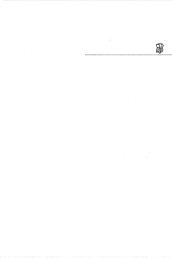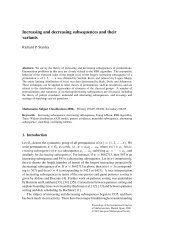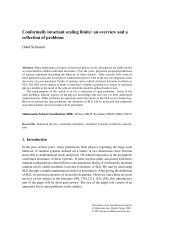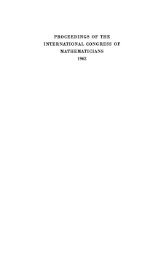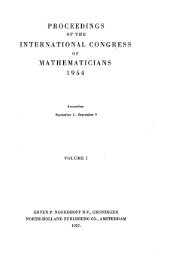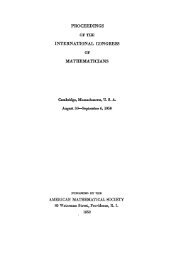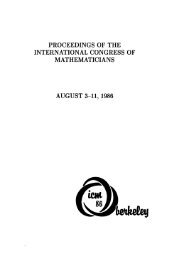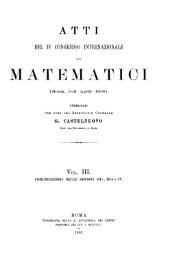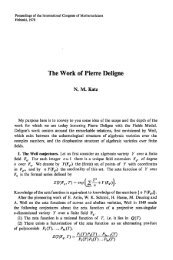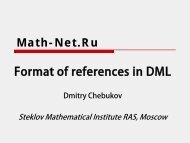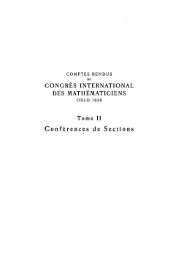- Page 1 and 2:
Beijing 2002August 20-28Proceedings
- Page 3 and 4:
ContentsSection 1. LogicE. Bouscare
- Page 5 and 6:
R. Pandharipande: Three Questions i
- Page 7 and 8:
Section 1. LogicE. Bouscaren: Group
- Page 9 and 10:
4 E. Bouscaren2. Different notions
- Page 11 and 12:
6 E. BouscarenWe now consider an al
- Page 13 and 14:
8 E. Bouscarendimension would need
- Page 15 and 16:
10 E. Bouscaren1. Either G is not o
- Page 17 and 18:
12 E. Bouscaren[7] E. Bouscaren & F
- Page 19 and 20:
14 J. Denef F. Loeserthis theory to
- Page 21 and 22:
16 J. Denef F. Loeserwill require m
- Page 23 and 24:
18 J. Denef F. Loeserseries P P (T)
- Page 25 and 26:
20 J. Denef F. Loeserfor all m> n.
- Page 27 and 28:
22 J. Denef F. Loeseri > 1. One ver
- Page 29 and 30:
ICM 2002 • Vol. II • 25-33Autom
- Page 31 and 32:
Automorphism Groups of Saturated St
- Page 33 and 34:
Automorphism Groups of Saturated St
- Page 35 and 36:
Automorphism Groups of Saturated St
- Page 37 and 38:
Automorphism Groups of Saturated St
- Page 39 and 40:
ICM 2002 • Vol. II • 37-45Repre
- Page 41 and 42:
3. The Blanchfield pairingRepresent
- Page 43 and 44:
Representations of Braid Groups 41n
- Page 45 and 46:
Representations of Braid Groups 43A
- Page 47 and 48:
Representations of Braid Groups 45T
- Page 49 and 50:
48 A.Bondal D.Orlovis believed to b
- Page 51 and 52:
50 A.Bondal D.OrlovDefinition 4 [BK
- Page 53 and 54:
52 A.Bondal D.OrlovLet Y be a smoot
- Page 55 and 56:
54 A.Bondal D.OrlovIn particular, w
- Page 57 and 58:
56 A.Bondal D.Orlov[BVdB] Bondal A.
- Page 59 and 60:
58 M. Levine(PB) Let £ be a rank r
- Page 61 and 62:
60 M. Levine2. Let 1Z d%m (X) be th
- Page 63 and 64:
62 M. LevineNow, if P = P(ci,. •
- Page 65 and 66:
64 M. LevineProof. For CH*, this us
- Page 67 and 68:
66 M. Levineis an isomorphism. Sinc
- Page 69 and 70:
68 Cheryl E. Praegeranalysis. Analo
- Page 71 and 72:
70 Cheryl E. Praegers-arc-transitiv
- Page 73 and 74:
72 Cheryl E. Praegercase a good kno
- Page 75 and 76:
74 Cheryl E. Praeger5. Simple group
- Page 77 and 78:
76 Cheryl E. Praeger[15] C. H. Li,
- Page 79 and 80:
78 Markus Rost1. Norm varietiesAll
- Page 81 and 82:
80 Markus RostWe apply the degree f
- Page 83 and 84:
82 Markus Rost4. Hubert's 90 for sy
- Page 85 and 86:
84 Markus RostFor n = 2 one can tak
- Page 87 and 88:
ICM 2002 • Vol. II • 87^92Dioph
- Page 89 and 90:
Diophantine Geometry over Groups an
- Page 91 and 92:
Diophantine Geometry over Groups an
- Page 93 and 94:
ICM 2002 • Vol. II • 93^103None
- Page 95 and 96:
Noncommutative Projective Geometry
- Page 97 and 98:
Noncommutative Projective Geometry
- Page 99 and 100:
Noncommutative Projective Geometry
- Page 101 and 102:
Noncommutative Projective Geometry
- Page 103 and 104:
Noncommutative Projective Geometry
- Page 105 and 106:
106 Dimitri Tamarkinalgebra and def
- Page 107 and 108:
108 Dimitri TamarkinThe product on
- Page 109 and 110:
110 Dimitri TamarkinProof. Let F =
- Page 111 and 112:
112 Dimitri Tamarkin2.5.9.Similarly
- Page 113 and 114:
114 Dimitri TamarkinComputeJ2,jl(a
- Page 115 and 116:
116 Dimitri Tamarkin3.2.1.To descri
- Page 117 and 118:
ICM 2002 • Vol. II • 119-128Con
- Page 119 and 120:
Converse Theorems, Functoriality, a
- Page 121 and 122:
Converse Theorems, Functoriality, a
- Page 123 and 124:
Converse Theorems, Functoriality, a
- Page 125 and 126:
Converse Theorems, Functoriality, a
- Page 127 and 128:
ICM 2002 • Vol. II • 129^138Con
- Page 129 and 130:
Constructing and Counting Number Fi
- Page 131 and 132:
Constructing and Counting Number Fi
- Page 133 and 134:
Constructing and Counting Number Fi
- Page 135 and 136:
Constructing and Counting Number Fi
- Page 137 and 138:
ICM 2002 • Vol. II • 139-148Ana
- Page 139 and 140:
Analyse p-adique et Représentation
- Page 141 and 142:
Analyse p-adique et Représentation
- Page 143 and 144:
Analyse p-adique et Représentation
- Page 145 and 146:
Analyse p-adique et Représentation
- Page 147 and 148:
ICM 2002 • Vol. II • 149-162Equ
- Page 149 and 150:
Equiv. Bloch-Kato Conjecture and No
- Page 151 and 152:
Equiv. Bloch-Kato Conjecture and No
- Page 153 and 154:
Equiv. Bloch-Kato Conjecture and No
- Page 155 and 156:
Equiv. Bloch-Kato Conjecture and No
- Page 157 and 158: Equiv. Bloch-Kato Conjecture and No
- Page 159 and 160: [17;[is;[19;[20;[21[22[23;[24;[25;[
- Page 161 and 162: ICM 2002 • Vol. II • 163-171Tam
- Page 163 and 164: Tamagawa Number Conjecture for zeta
- Page 165 and 166: Tamagawa Number Conjecture for zeta
- Page 167 and 168: Tamagawa Number Conjecture for zeta
- Page 169 and 170: Tamagawa Number Conjecture for zeta
- Page 171 and 172: 174 S. S. Kudlaseries with represen
- Page 173 and 174: t.176 S. S. Kudlais the exponential
- Page 175 and 176: 178 S. S. Kudlawhere Z = J2ì n ìP
- Page 177 and 178: 180 S. S. Kudla(ii) T £ Sym 2 (Z)>
- Page 179 and 180: 182 S. S. KudlaTheorem 6. ([13], [9
- Page 181 and 182: ICM 2002 • Vol. II • 185-195Ell
- Page 183 and 184: Elliptic Curves and Class Field The
- Page 185 and 186: Elliptic Curves and Class Field The
- Page 187 and 188: Elliptic Curves and Class Field The
- Page 189 and 190: Elliptic Curves and Class Field The
- Page 191 and 192: Elliptic Curves and Class Field The
- Page 193 and 194: 198 E. UllmoSoit X une variété al
- Page 195 and 196: 200 E. UllmoThéorème 2.4 Soit X u
- Page 197 and 198: 202 E. UllmoQuestion 4.1 Soit x n =
- Page 199 and 200: 204 E. UllmoNotons que cet énoncé
- Page 201 and 202: 206 E. Ullmo[17] H. Oh. Uniform Poi
- Page 203 and 204: 208 T. D. WooleyWaring's problem as
- Page 205 and 206: 210 T. D. Wooleycircumstances one h
- Page 207: 212 T. D. Wooleywith 1 < z,w < F, M
- Page 211 and 212: 216 T. D. Wooleytions involving nor
- Page 213 and 214: Section 4. Differential GeometryB.
- Page 215 and 216: 222 B. Andrewspotentially applicabl
- Page 217 and 218: 224 B. Andrewssurface can look metr
- Page 219 and 220: 226 B. Andrewsboundary of the set {
- Page 221 and 222: 228 B. Andrewseach t > 0, to either
- Page 223 and 224: 230 B. AndrewsUSSR Izv. 20 (1983).[
- Page 225 and 226: 232 Robert Bartnikprovides an impor
- Page 227 and 228: 234 Robert BartnikTheorem 2 If (M,
- Page 229 and 230: 236 Robert BartnikThe horizon condi
- Page 231 and 232: 238 Robert BartnikTheorem 8 Suppose
- Page 233 and 234: 240 Robert BartnikPhysics, LNP 212.
- Page 235 and 236: 242 P. Biran2. Various intersection
- Page 237 and 238: 244 P. BiranTheorem E'. Let (M,oj)
- Page 239 and 240: 246 P. Biransymplectic packings in
- Page 241 and 242: 248 P. Birangroup of Hamiltonian di
- Page 243 and 244: 250 P. Birannumber of steps it take
- Page 245 and 246: 252 P. Biranbe used to obtain many
- Page 247 and 248: 254 P. Biran[6] P. Biran, A stabili
- Page 249 and 250: ICM 2002 • Vol. II • 257-271Bla
- Page 251 and 252: Black Holes and the Penrose Inequal
- Page 253 and 254: Black Holes and the Penrose Inequal
- Page 255 and 256: Black Holes and the Penrose Inequal
- Page 257 and 258: Black Holes and the Penrose Inequal
- Page 259 and 260:
Black Holes and the Penrose Inequal
- Page 261 and 262:
Black Holes and the Penrose Inequal
- Page 263 and 264:
[23;[24;[25;[26;[27[28;[29'[30^Blac
- Page 265 and 266:
274 Xiuxiong ChenFor simplicity, in
- Page 267 and 268:
276 Xiuxiong ChenTheorem 0.1. [14]
- Page 269 and 270:
278 Xiuxiong ChenQuestion 0.6. (Don
- Page 271 and 272:
280 Xiuxiong Chencurvature in S 2 c
- Page 273 and 274:
282 Xiuxiong Chen[12] X. X. Chen an
- Page 275 and 276:
284 Weiyue DingSehrödinger flows a
- Page 277 and 278:
286 Weiyue DingIn order to prove Th
- Page 279 and 280:
288 Weiyue DingFor the first term i
- Page 281 and 282:
290 Weiyue Dingwhich satisfies the
- Page 283 and 284:
ICM 2002 • Vol. II • 293^302Dif
- Page 285 and 286:
Differential Geometry via Harmonic
- Page 287 and 288:
then eitherorDifferential Geometry
- Page 289 and 290:
Differential Geometry via Harmonic
- Page 291 and 292:
Differential Geometry via Harmonic
- Page 293 and 294:
ICM 2002 • Vol. II • 303-313Ind
- Page 295 and 296:
Index Iteration Theory for Symplect
- Page 297 and 298:
Index Iteration Theory for Symplect
- Page 299 and 300:
Index Iteration Theory for Symplect
- Page 301 and 302:
Index Iteration Theory for Symplect
- Page 303 and 304:
Index Iteration Theory for Symplect
- Page 305 and 306:
316 Anton PetruninTheorem A. Given
- Page 307 and 308:
318 Anton PetruninRiemannian manifo
- Page 309 and 310:
320 Anton Petruninspace. In the cas
- Page 311 and 312:
ICM 2002 • Vol. II • 323-338Col
- Page 313 and 314:
Collapsed Riemannian Manifolds with
- Page 315 and 316:
Collapsed Riemannian Manifolds with
- Page 317 and 318:
Collapsed Riemannian Manifolds with
- Page 319 and 320:
Collapsed Riemannian Manifolds with
- Page 321 and 322:
Collapsed Riemannian Manifolds with
- Page 323 and 324:
Collapsed Riemannian Manifolds with
- Page 325 and 326:
Collapsed Riemannian Manifolds with
- Page 327 and 328:
ICM 2002 • Vol. II • 339-349Com
- Page 329 and 330:
Complex Hyperbolic Triangle Groups
- Page 331 and 332:
Complex Hyperbolic Triangle Groups
- Page 333 and 334:
Complex Hyperbolic Triangle Groups
- Page 335 and 336:
Complex Hyperbolic Triangle Groups
- Page 337 and 338:
Complex Hyperbolic Triangle Groups
- Page 339 and 340:
352 Paul Seideldeformation spaces.
- Page 341 and 342:
354 Paul Seidelforgetting all the p
- Page 343 and 344:
356 Paul SeidelTheorem 3. Si,...,S
- Page 345 and 346:
358 Paul Seidelwhich must be of ord
- Page 347 and 348:
360 Paul Seidel[10] E. Getzler, Bat
- Page 349 and 350:
362 Weiping Zhang(iii) The heat ker
- Page 351 and 352:
364 Weiping Zhang3. The index theor
- Page 353 and 354:
366 Weiping Zhangwhere ch(g) is the
- Page 355 and 356:
- T p ( P d M , > 0 , 9 P d M , > 0
- Page 357 and 358:
Section 5. TopologyMladen Bestvina:
- Page 359 and 360:
374 Mladen Bestvinaof Out(F n ) coc
- Page 361 and 362:
376 Mladen Bestvina3. Culler-Vogtma
- Page 363 and 364:
378 Mladen BestvinaDefinition 8. A
- Page 365 and 366:
380 Mladen Bestvinaand then gluing
- Page 367 and 368:
382 Mladen BestvinaAnal. 10 (2000),
- Page 369 and 370:
384 Mladen Bestvina63 John R. Stall
- Page 371 and 372:
386 Yu. V. Chekanovplu I,Figure 1:
- Page 373 and 374:
388 Yu. V. Chekanovwithout loss of
- Page 375 and 376:
390 Yu. V. ChekanovFigure 2: Lagran
- Page 377 and 378:
392 Yu. V. ChekanovFigure 5: Local
- Page 379 and 380:
394 Yu. V. Chekanovderived from the
- Page 381 and 382:
396 M. Furatadimensional vector spa
- Page 383 and 384:
398 M. FurataHowever in the Seiberg
- Page 385 and 386:
400 M. Furata6. Seiberg-Witten-Floe
- Page 387 and 388:
402 M. Furata[14] K. Fukaya & K. On
- Page 389 and 390:
ICM 2002 • Vol. II • 405-114Gé
- Page 391 and 392:
Géométrie de Contact 407- la sph
- Page 393:
Géométrie de Contact 4093) chaque
- Page 396 and 397:
412 E. Giroux- en tout point p où
- Page 398 and 399:
414 E. Giroux[EU] Y. ELIASHBERG, Cl
- Page 400 and 401:
416 L. Hesselholt1. Algebraic üC-t
- Page 402 and 403:
418 L. Hesselholt(i) a pro-log diff
- Page 404 and 405:
420 L. HesselholtThe canonical map
- Page 406 and 407:
422 L. Hesselholttogether with a mu
- Page 408 and 409:
424 L. Hesselholtwhere \'- GK —^
- Page 410 and 411:
ICM 2002 • Vol. II • 427-436Sym
- Page 412 and 413:
Symplectic Sums and Gromov-Witten I
- Page 414 and 415:
Symplectic Sums and Gromov-Witten I
- Page 416 and 417:
Symplectic Sums and Gromov-Witten I
- Page 418 and 419:
Symplectic Sums and Gromov-Witten I
- Page 420 and 421:
ICM 2002 • Vol. II • 437-146Kno
- Page 422 and 423:
Knots, von Neumann Signatures, and
- Page 424 and 425:
Knots, von Neumann Signatures, and
- Page 426 and 427:
Knots, von Neumann Signatures, and
- Page 428 and 429:
Knots, von Neumann Signatures, and
- Page 430 and 431:
ICM 2002 • Vol. II • 447-156Str
- Page 432 and 433:
Strings and the Stable Cohomology o
- Page 434 and 435:
Strings and the Stable Cohomology o
- Page 436 and 437:
Strings and the Stable Cohomology o
- Page 438 and 439:
Strings and the Stable Cohomology o
- Page 440 and 441:
ICM 2002 • Vol. II • 457-168Non
- Page 442 and 443:
Non-zero Degree Maps between 3-Mani
- Page 444 and 445:
Non-zero Degree Maps between 3-Mani
- Page 446 and 447:
Non-zero Degree Maps between 3-Mani
- Page 448 and 449:
Non-zero Degree Maps between 3-Mani
- Page 450 and 451:
Non-zero Degree Maps between 3-Mani
- Page 452 and 453:
Section 6. Algebraic and Complex Ge
- Page 454 and 455:
472 Hélène Esnaultto ^klX)/k carr
- Page 456 and 457:
474 Hélène Esnaultf*c 2 (E, V) is
- Page 458 and 459:
476 Hélène EsnaultTheorem 3.1 ([5
- Page 460 and 461:
478 Hélène Esnaultno longer the c
- Page 462 and 463:
480 Hélène EsnaultQuestion 5.4. W
- Page 464 and 465:
ICM 2002 • Vol. II • 483-494Hil
- Page 466 and 467:
Hilbert Schemes of Points on Surfac
- Page 468 and 469:
and use this to define operatorsHil
- Page 470 and 471:
Hilbert Schemes of Points on Surfac
- Page 472 and 473:
Hilbert Schemes of Points on Surfac
- Page 474 and 475:
Hilbert Schemes of Points on Surfac
- Page 476 and 477:
ICM 2002 • Vol. II • 495-502Vec
- Page 478 and 479:
Vector Bundles on a K3 Surface 497s
- Page 480 and 481:
Vector Bundles on a K3 Surface 499A
- Page 482 and 483:
Vector Bundles on a K3 Surface 501a
- Page 484 and 485:
ICM 2002 • Vol. II • 503-512Thr
- Page 486 and 487:
Three Questions in Gromov-Witten Th
- Page 488 and 489:
Three Questions in Gromov-Witten Th
- Page 490 and 491:
Three Questions in Gromov-Witten Th
- Page 492 and 493:
Three Questions in Gromov-Witten Th
- Page 494 and 495:
ICM 2002 • Vol. II • 513^524Upd
- Page 496 and 497:
Update on 3-folds 515in the hyperbo
- Page 498 and 499:
Update on 3-folds 517In many contex
- Page 500 and 501:
Update on 3-folds 5193.3. Explicit
- Page 502 and 503:
Update on 3-folds 521The modem view
- Page 504 and 505:
Update on 3-folds 523is entertainin
- Page 506 and 507:
ICM 2002 • Vol. II • 525-532Sur
- Page 508 and 509:
Sur les Algèbres Vertex Attachées
- Page 510 and 511:
Sur les Algèbres Vertex Attachées
- Page 512 and 513:
Sur les Algèbres Vertex Attachées
- Page 514 and 515:
ICM 2002 • Vol. II • 533-541Top
- Page 516 and 517:
Topology of Singular Algebraic Vari
- Page 518 and 519:
Topology of Singular Algebraic Vari
- Page 520 and 521:
Topology of Singular Algebraic Vari
- Page 522 and 523:
Topology of Singular Algebraic Vari
- Page 524 and 525:
ICM 2002 • Vol. II • 545-554Har
- Page 526 and 527:
Harmonie Analysis on Real Reductive
- Page 528 and 529:
Harmonie Analysis on Real Reductive
- Page 530 and 531:
Harmonie Analysis on Real Reductive
- Page 532 and 533:
[BS3][BS4][Be]Harmonie Analysis on
- Page 534 and 535:
ICM 2002 • Vol. II • 555-570On
- Page 536 and 537:
On the Dynamical Yang-Baxter Equati
- Page 538 and 539:
On the Dynamical Yang-Baxter Equati
- Page 540 and 541:
On the Dynamical Yang-Baxter Equati
- Page 542 and 543:
On the Dynamical Yang-Baxter Equati
- Page 544 and 545:
On the Dynamical Yang-Baxter Equati
- Page 546 and 547:
On the Dynamical Yang-Baxter Equati
- Page 548 and 549:
On the Dynamical Yang-Baxter Equati
- Page 550 and 551:
ICM 2002 • Vol. II • 571-582Geo
- Page 552 and 553:
Geometrie Langlands Correspondence
- Page 554 and 555:
Geometrie Langlands Correspondence
- Page 556 and 557:
Geometrie Langlands Correspondence
- Page 558 and 559:
Geometrie Langlands Correspondence
- Page 560 and 561:
Geometrie Langlands Correspondence
- Page 562 and 563:
ICM 2002 • Vol. II • 583-597On
- Page 564 and 565:
On the Local Langlands Corresponden
- Page 566 and 567:
On the Local Langlands Corresponden
- Page 568 and 569:
On the Local Langlands Corresponden
- Page 570 and 571:
On the Local Langlands Corresponden
- Page 572 and 573:
On the Local Langlands Corresponden
- Page 574 and 575:
On the Local Langlands Corresponden
- Page 576 and 577:
On the Local Langlands Corresponden
- Page 578 and 579:
600 A. KlyachkoAmong commonly known
- Page 580 and 581:
602 A. KlyachkoBy Theorem 2.3 this
- Page 582 and 583:
604 A. Klyachkois stable iff for ev
- Page 584 and 585:
606 A. KlyachkoUnitary spectral pro
- Page 586 and 587:
608 A. Klyachkospectra. By Metha-Se
- Page 588 and 589:
610 A. KlyachkoAgain our experience
- Page 590 and 591:
612 A. Klyachko[9] G. Faltings, Mum
- Page 592 and 593:
ICAl 2002 • Vol. II • 615-627Br
- Page 594 and 595:
Branching Problems of Unitary Repre
- Page 596 and 597:
Branching Problems of Unitary Repre
- Page 598 and 599:
Branching Problems of Unitary Repre
- Page 600 and 601:
Branching Problems of Unitary Repre
- Page 602 and 603:
Branching Problems of Unitary Repre
- Page 604 and 605:
Branching Problems of Unitary Repre
- Page 606 and 607:
630 Vikram Bhagvandas AlehtaDefinit
- Page 608 and 609:
632 Vikram Bhagvandas Alehtais in t
- Page 610 and 611:
634 Vikram Bhagvandas AlehtaTheorem
- Page 612 and 613:
ICAl 2002 • Vol. II • 637^642Cl
- Page 614 and 615:
Clifford Algebras and the Duflo Iso
- Page 616 and 617:
Clifford Algebras and the Duflo Iso
- Page 618 and 619:
ICAl 2002 • Vol. II • 643^654Re
- Page 620 and 621:
Representations of Yangians 6451.2.
- Page 622 and 623:
Representations of Yangians 6478 9
- Page 624 and 625:
Representations of Yangians 6492. T
- Page 626 and 627:
Representations of Yangians 651irre
- Page 628 and 629:
Representations of Yangians 6532.4.
- Page 630 and 631:
ICAl 2002 • Vol. II • 655-666Au
- Page 632 and 633:
Automorphic L-functions and Functor
- Page 634 and 635:
Automorphic L-functions and Functor
- Page 636 and 637:
Automorphic L-functions and Functor
- Page 638 and 639:
Automorphic L-functions and Functor
- Page 640 and 641:
Automorphic L-functions and Functor
- Page 642 and 643:
ICAl 2002 • Vol. II • 667^677Mo
- Page 644 and 645:
Modular Representations 669(l.b.2)
- Page 646 and 647:
Modular Representations 671e) Any p
- Page 648 and 649:
Modular Representations 673conjugac
- Page 650 and 651:
Modular Representations 675A genera
- Page 652 and 653:
Modular Representations 677^-repres
- Page 654 and 655:
ICAl 2002 • Vol. II • 681-690Va
- Page 656 and 657:
Value Distribution and Potential Th
- Page 658 and 659:
Value Distribution and Potential Th
- Page 660 and 661:
Value Distribution and Potential Th
- Page 662 and 663:
Value Distribution and Potential Th
- Page 664 and 665:
ICAl 2002 • Vol. II • 691-700Th
- Page 666 and 667:
The Branch Set of a Quasiregular Al
- Page 668 and 669:
The Branch Set of a Quasiregular Al
- Page 670 and 671:
The Branch Set of a Quasiregular Al
- Page 672 and 673:
The Branch Set of a Quasiregular Al
- Page 674 and 675:
ICAl 2002 • Vol. II • 701-709Ha
- Page 676 and 677:
Harmonie Aleasure and "Locally Flat
- Page 678 and 679:
Harmonie Aleasure and "Locally Flat
- Page 680 and 681:
Harmonie Aleasure and "Locally Flat
- Page 682 and 683:
Harmonie Aleasure and "Locally Flat
- Page 684 and 685:
712 N. Lerner1. From Hans Lewy to N
- Page 686 and 687:
714 N. Lernergood cases in (1.5) (w
- Page 688 and 689:
716 N. Lerner2. Counting the loss o
- Page 690 and 691:
718 N. LernerSolvability with loss
- Page 692 and 693:
720 N. Lerner6] L.Hörmander, On th
- Page 694 and 695:
722 C. ThieleA basic point of singu
- Page 696 and 697:
724 C. ThieleFigure 1: "Cone"< en I
- Page 698 and 699:
726 C. Thieleis negative. If all of
- Page 700 and 701:
728 C. Thielealso in these degenera
- Page 702 and 703:
730 C. ThieleThus he needed good co
- Page 704 and 705:
732 C. Thiele[6] Gilbert J., Nahmod
- Page 706 and 707:
I p : — \ J ( Z i , . . . , Z m )
- Page 708 and 709:
736 S. ZelditchTheorem 1 [2] The pa
- Page 710 and 711:
738 S. Zelditchfor U C
- Page 712 and 713:
740 S. Zelditch[Pi,Pj] = 0 and whos
- Page 714 and 715:
742 S. Zelditch[11] V. F. Lazutkin,
- Page 716 and 717:
744 Xiangyu Zhou+00 at the boundary
- Page 718 and 719:
746 Xiangyu Zhouconnected component
- Page 720 and 721:
748 Xiangyu ZhouWightman [32], Jost
- Page 722 and 723:
750 Xiangyu ZhouBrief proof is as f
- Page 724 and 725:
752 Xiangyu Zhou[11] Al. Jarnicki,
- Page 726 and 727:
Section 9. Operator Algebras andFun
- Page 728 and 729:
758 Semyon Alesker0.1.1 Definition,
- Page 730 and 731:
760 Semyon Alesker2. Translation in
- Page 732 and 733:
762 Semyon Alesker2.3. Valuations i
- Page 734 and 735:
764 Semyon AleskerReferences[1] Ale
- Page 736 and 737:
766 P. Bianewith classical cumulant
- Page 738 and 739:
768 P. BianeObserve thatr(ai ... a
- Page 740 and 741:
770 P. Biane4. Noncrossing cumulant
- Page 742 and 743:
772 P. Bianethis gives the order of
- Page 744 and 745:
774 P. Biane[20] R. Speicher, Combi
- Page 746 and 747:
776 D. Bischsubfactors has develope
- Page 748 and 749:
778 D. Bisch(for all k > 0), where
- Page 750 and 751:
780 D. BischObserve that by constru
- Page 752 and 753:
782 D. BischIt should be evident th
- Page 754 and 755:
784 D. Bisch[4] D. Bisch, Bimodules
- Page 756 and 757:
ICAl 2002 • Vol. II • 787^794Fr
- Page 758 and 759:
Free Probability, Free Entropy and
- Page 760 and 761:
Free Probability, Free Entropy and
- Page 762 and 763:
Free Probability, Free Entropy and
- Page 764 and 765:
ICAl 2002 • Vol. II • 795^812Ba
- Page 766 and 767:
Banach KK-theory and the Baum-Conne
- Page 768 and 769:
Banach KK-theory and the Baum-Conne
- Page 770 and 771:
Banach KK-theory and the Baum-Conne
- Page 772 and 773:
Banach KK-theory and the Baum-Conne
- Page 774 and 775:
Banach KK-theory and the Baum-Conne
- Page 776 and 777:
Banach KK-theory and the Baum-Conne
- Page 778 and 779:
Banach KK-theory and the Baum-Conne
- Page 780 and 781:
Banach KK-theory and the Baum-Conne
- Page 782 and 783:
ICAl 2002 • Vol. II • 813-822On
- Page 784 and 785:
On Some Inequalities for Gaussian A
- Page 786 and 787:
On Some Inequalities for Gaussian A
- Page 788 and 789:
On Some Inequalities for Gaussian A
- Page 790 and 791:
On Some Inequalities for Gaussian A
- Page 792:
Author IndexAlesker, Semyon 757Andr



